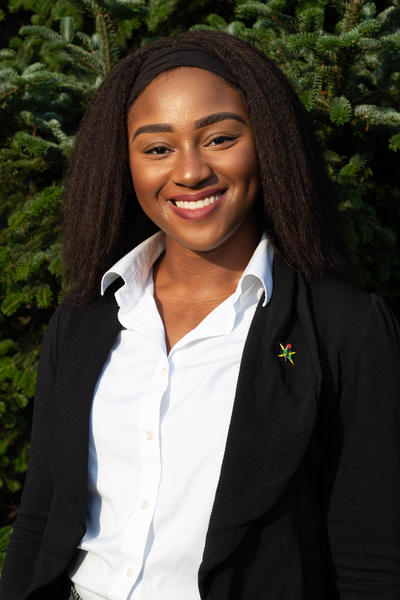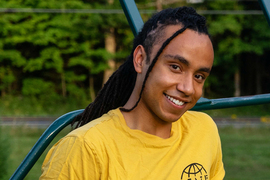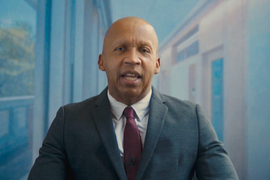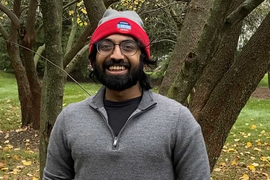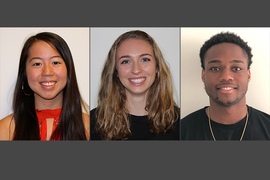When Obiageli “Oby” Nwodoh arrived at MIT, she already felt at home. A native of Bedford, Massachusetts, she was the daughter of Thomas Nwodoh, a former MIT Media Lab researcher; her first physics teacher at Bedford High was an MIT alum, Joe Zahka; and she had participated in the Minority Introduction to Engineering and Science (MITES) program.
At MIT, she studied physics, excelling in research, data analytics, machine learning, and computer programming. “I fell in love with physics because it touched reality,” says Nwodoh. “I had a way of explaining the world in numbers when words were challenging. It was learning a new language and using it to describe the world.”
But her interests began to drift toward economic justice. Away from home, she slowly began to understand the economic inequality her family had always experienced. Though unaware as a child, she later learned her family benefited from certain antipoverty initiatives. “It helped us immensely with paying bills, funding extracurricular programs, and more,” she says.
The final click for her was during an internship with a defense contractor, which didn’t match with her political views. She wanted to take her career in a more people-focused direction, so as a sophomore, she enrolled in classes and extracurricular activities that stoked her interests in social justice, science activism, public policy, and equity and diversity.
That’s when dawned on this physics student that she wanted to be a lawyer. And she was surprised at how well the two disparate fields complemented each other.
“The law requires the critical thinking offered by physics," she says. "With both, there is always the need to observe global issues, obtain necessary data, and use some framework to find a solution. I wanted to solve hard world problems, but those that helped people. The law was an outlet to solving major world issues that I experienced as a child. I believe that in America, we are so comfortable with poverty. The law has been a way to change that, along with many other issues.”
Nwodoh worked for several summers with Greater Boston Legal Services’ low-income tax clinic, on cases pertaining to taxes, immigration, and employment. “It was meaningful because I was solving so many issues my own single mother faced,” she says.
By the second summer with GBLS, her work was helping with pandemic stimulus checks. “What really opened up my eyes was how the pandemic affected low-income populations,” she says. “The stimulus provided money for people, but I didn’t hear enough about people who didn’t receive the checks, including immigrants and many people receiving federal assistance through welfare. There were a lot of forgotten people in the pandemic. My work at GBLS solidified my interest in the law and how much impact it could have.”
As a host for the Division of Student Life's podcast “MIT Is…” Nwodoh and her co-host Gabe Owens ’21 explored everything from MIT student life to global issues. She turned some of her research projects into podcasts about immigration, minority voter suppression, and the U.S. tax code, and another podcast turned into a research project where she examined how tax credits could be distributed in the state of New York to maximize payout. “I have dreams of starting my own show one day,” she says.
Nwodoh later worked with the Harvard College Black Pre-Law Association, before helping launch the MIT Pre-Law Society to connect students with relevant career opportunities, classes, and resources. She also was active with the National Society of Black Engineers, and was a peer career advisor at MIT’s Career Advising and Professional Development office. “So many face imposter syndrome, both academically and professionally. Being able to hype a student up and reassure them of their capabilities always filled me with joy,” she says.
Her physics education continued to play a role in her legal work. When she researched policing and voting, and steered various projects as a virtual racial justice data analyst intern with the NAACP Legal Defense and Education Fund, she relied on her skills as a scientist.
“I saw how there was a plethora of data in the world, but not as many people who knew how to use it. Though my experience was short, it inspired me to learn more about data analytics and how it could be useful in the law, ethics, and other fields.”
After graduating this spring with a major in physics and a minor in political science, she became a program paralegal at Ropes and Gray in Chicago, and is looking into law schools. She hopes to focus on technology, such as the impact that algorithm bias has on vulnerable populations.
“I have cherished how being a physicist has prepared me to not be a physicist," she says. "Physics taught me the importance of problem-solving which could be applied in other areas of my life and interests. The technical skills could be used to ‘hack’ different parts of my world. Physics and the law come down to the same thing: interacting with the world in a profound way. MIT taught me that there is always space for my skills in every nook and cranny of the world’s biggest questions. I feel like my work as a physicist has prepared me to delve deeper into any issue, and holds me to an ethical standard of doing so.”
